TL;DR: We ran a Donation Election in which 341 Forum users[1] voted on how we should allocate the Donation Election Fund ($34,856[2]). The winners are:
- Rethink Priorities - $12,847.75
- Charity Entrepreneurship: Incubated Charities Fund - $11,351.11
- Animal Welfare Fund (EA Funds) - $10,657.07
This post shares more information about the results:
- Comments from voters about their votes: patterns include referencing organizations' marginal funding posts, updating towards the neglectedness of animal welfare, appreciating strong track records, etc.
- Voting patterns: most people voted for 2-4 candidates (at least one of which was one of the three winners), usually in multiple cause areas
- Cause area stats: similar numbers of points went to cross-cause, animal welfare, risk/future-oriented, and global health candidates (ranked in that order)
- All candidate results, including raw point[3] totals: the Long-Term Future Fund initially placed second by raw point totals
- Concluding thoughts & other charities
You can find some extra information in this spreadsheet.
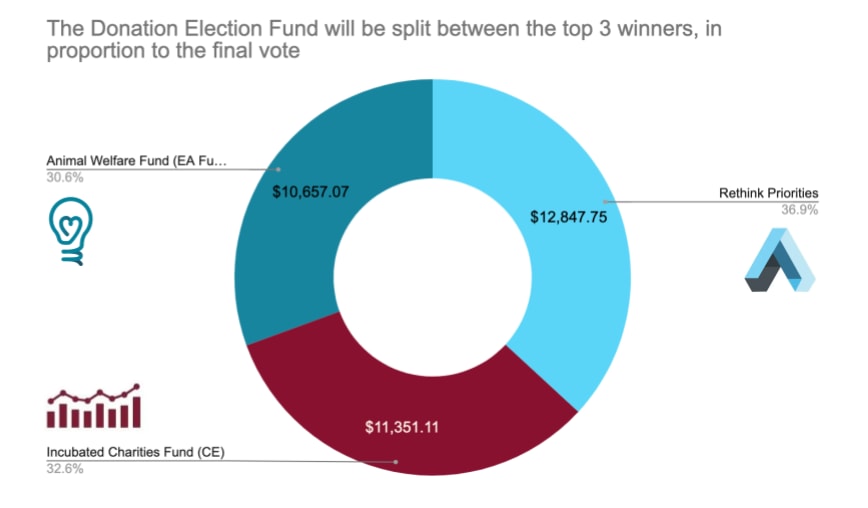
Highlights from the comments: why people voted the way they did
We asked voters if they wanted to share a note about why they voted the way they did. 74 people (~20%) wrote a comment. I’m sharing a few excerpts[4] below, and more in a comment on this post (separated for the sake of space) — consider reading the longer version if you have a moment.
There were some recurring patterns in different people’s notes, some of which appear in these two comments explaining their authors’ votes:
- "[AWF], because I was convinced by the post about how animal welfare dominates in non-longtermist causes, [CE], so that there can be even more excellent ways of making the world a better place by donating, [GWWC], because I wish we had unlimited money to give to all the others"
- “Realized I'm too partial to [global health] and biased against animal welfare, [so I decided to vote for the] most effective animal organization. Rethink's post was very convincing. CE has the most innovative ideas in GHD and it isn't close. GiveWell is GiveWell.”
Rethink Priorities’s funding request post was mentioned a lot. People also noted specific aspects of RP’s work that they appreciate, like the EA Survey, public benefits/publishing research on cause prioritization, moral weights work, and research into particularly neglected animals. There were also shoutouts to the staff:
- “ALLFED and Rethink Priorities both consist of highly talented and motivated individuals that are working on high-potential, high-impact projects. Both organizations have left a strong impression on me in terms of their approach to reasoning and problem solving. [...] Both organizations have recently posted extremely well-detailed [updates on their financial situation and how additional funding would help]. [...]”
CE’s Incubated Charities Fund (and Charity Entrepreneurship more broadly) got a lot of appreciation for their good and/or unusual ideas and track record. There were also comments like:
- “...direct-action global health charities need more funding now, especially in light of reductions in future funding from Open Phil. [And] there's enough potential upside to charity incubation to put a good bit of money there.”
A number of people wrote that they’d updated towards donating to animal welfare as a result of recent discussions (often explicitly because of this post). Many gave a lot of their points to the Animal Welfare Fund, sometimes referencing GWWC’s evaluations of the evaluators. Some also said they wanted to vote for animal welfare to correct for what they saw as its relative neglectedness in EA or to emphasize that it has a central place in EA. One example:
- “I voted for animal charities to [...] direct the money to where it can do a lot of good, but also to demonstrate to the EA community that *animal welfare belongs as a central EA cause area.* As an EA working on AI risk, I feel very deeply that this community should continue to stand up for sentient beings who are experiencing unimaginable suffering now. [...] Why these particular animal welfare donations [ACE, THL, AWF]? I want to strengthen central institutions in animal welfare so that they can in turn use their best judgment to distribute funds among tried-and-tested and speculative giving opportunities."
There are more comments about why people gave points or donated to other candidates, as well as other considerations people shared in the full-length “Appendix Comment” below.
Broader patterns:
- A number of people said they work in one field (e.g. existential risk reduction) but want to donate to a different field (e.g. global health, animal welfare), either because they believe those causes could use funding better than others (while others might use labor better) or because they wanted to split their/EA resources across causes.
- Some referenced specific posts or recent changes, while others said they went with cached thoughts.
- People also shared some thoughts related to Giving Season — two examples:
- “...Would have LOVED more debates/ posts about ‘LTFF vs ALLFED?’ and ‘EA Funds Animal Welfare Fund vs. The Humane League?’” (This person also cited two posts.)
- “ … I [...] found the marginal funding posts super interesting. It made me more excited about earning to give and helped me understand the perspective of nonprofits engaged in fundraising, particularly the posts from RP (Peter Wildeford and Abraham Rowe).”
Finally, shoutout to the voter who added: “Thank you for listening to my TED talk. I am legally obligated to tell you this is not financia-, err, altruism advice” after their comment. (If you want to see more highlights, check out the full-length "comment appendix".)
Voting patterns: how did people distribute their points?
Most voters gave some or all of their points to at least one of the 3 winning candidates.
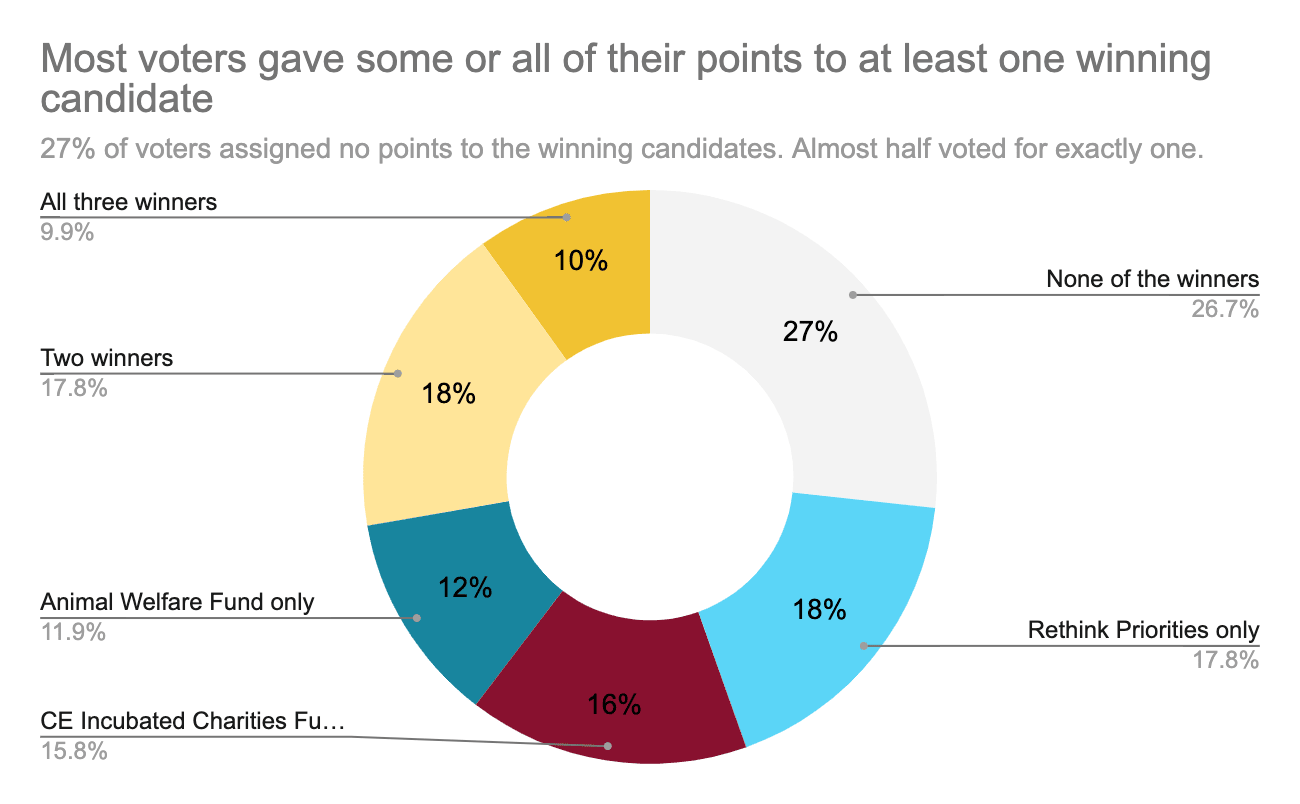
27% of voters didn’t give any points to any of the 3 winning candidates.[5] Those voters seemed a bit more likely to give points to GiveDirectly, LTFF, AMF, and Malaria Consortium — and not give points to ACE Movement Grants, Wild Animal Initiative, Fish Welfare Initiative, and Giving What We Can.
32% of voters said their donation priorities changed as a result of Giving Season (54% said their priorities didn’t change)
Out of people whose priorities had changed at least "a bit" as a result of the Forum's Giving Season, 16 said their donation priorities changed “noticeably” or “totally."
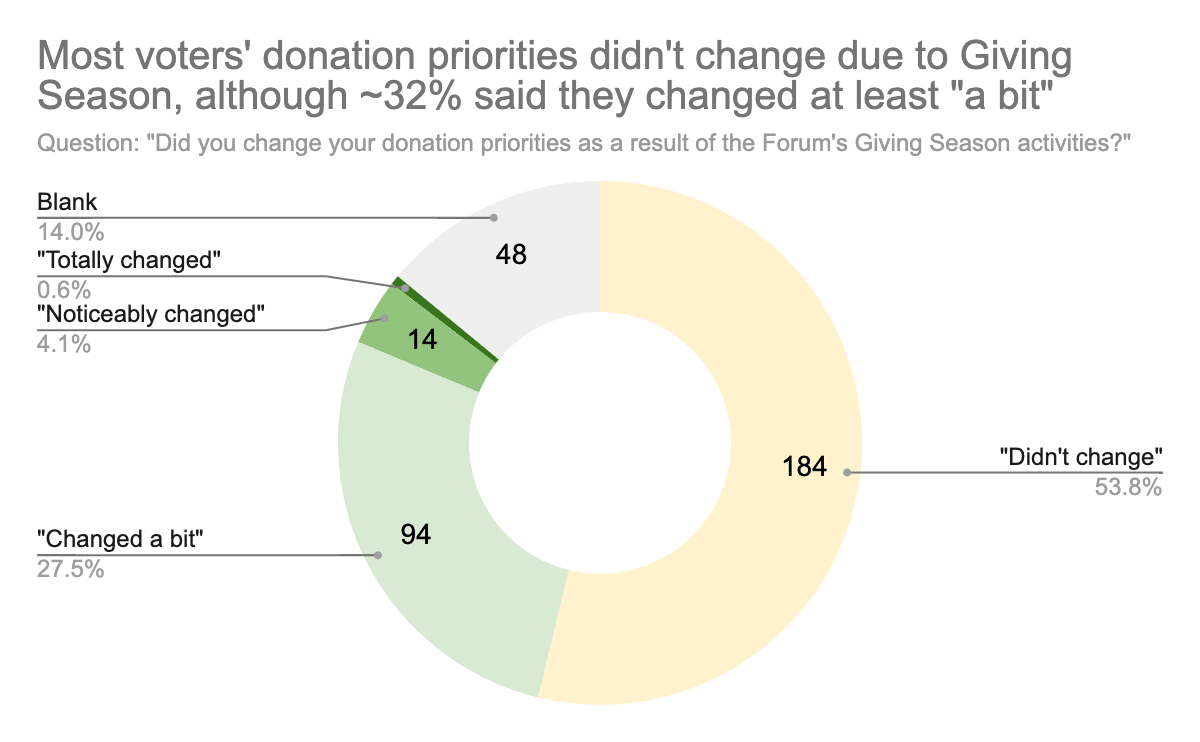
People who said their donation priorities changed at least a bit tended to give more points to the Animal Welfare Fund, CE’s Incubated Charities Fund, Rethink Priorities, ALLFED, and the Humane League (the difference between them and the “no change” voters is strongest for candidates earlier in that list) and less to GiveDirectly, EAIF, and MIRI (note that this is a pretty small sample, and also it’s unclear if their “priorities changing” was what led to that difference — they’re also probably a pretty unusual group in other ways). People who reported greater priority changes (16 people) followed a similar pattern, generally with stronger effects (likely in part due to small samples’ greater relative variance).
Most voters gave points to 2-4 candidates
The median voter assigned points to 3 candidates (the average was 4.5, as some people gave points to many projects[6]).
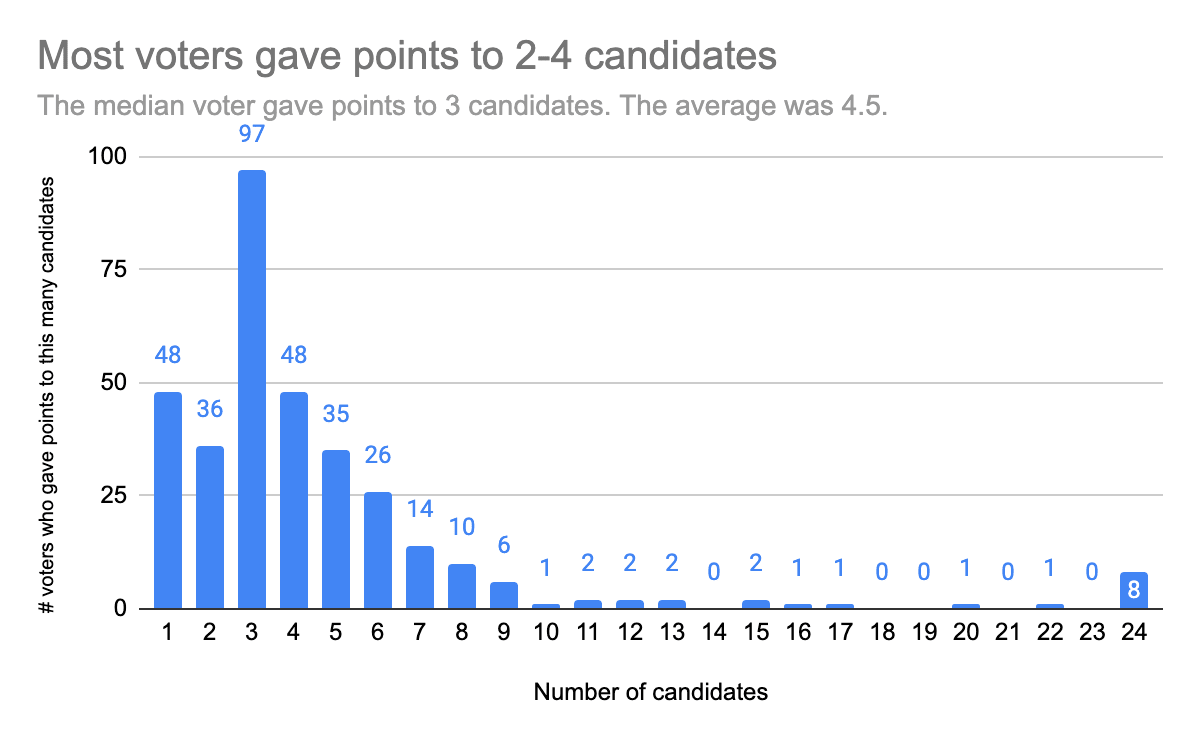
Most voters gave points to multiple causes
There were some (27%) all-in voters who gave all their points to candidates in a single cause area (out of four broad causes), but most gave points to multiple causes. (In fact, most gave at least 10% of their votes to at least two causes.[7])
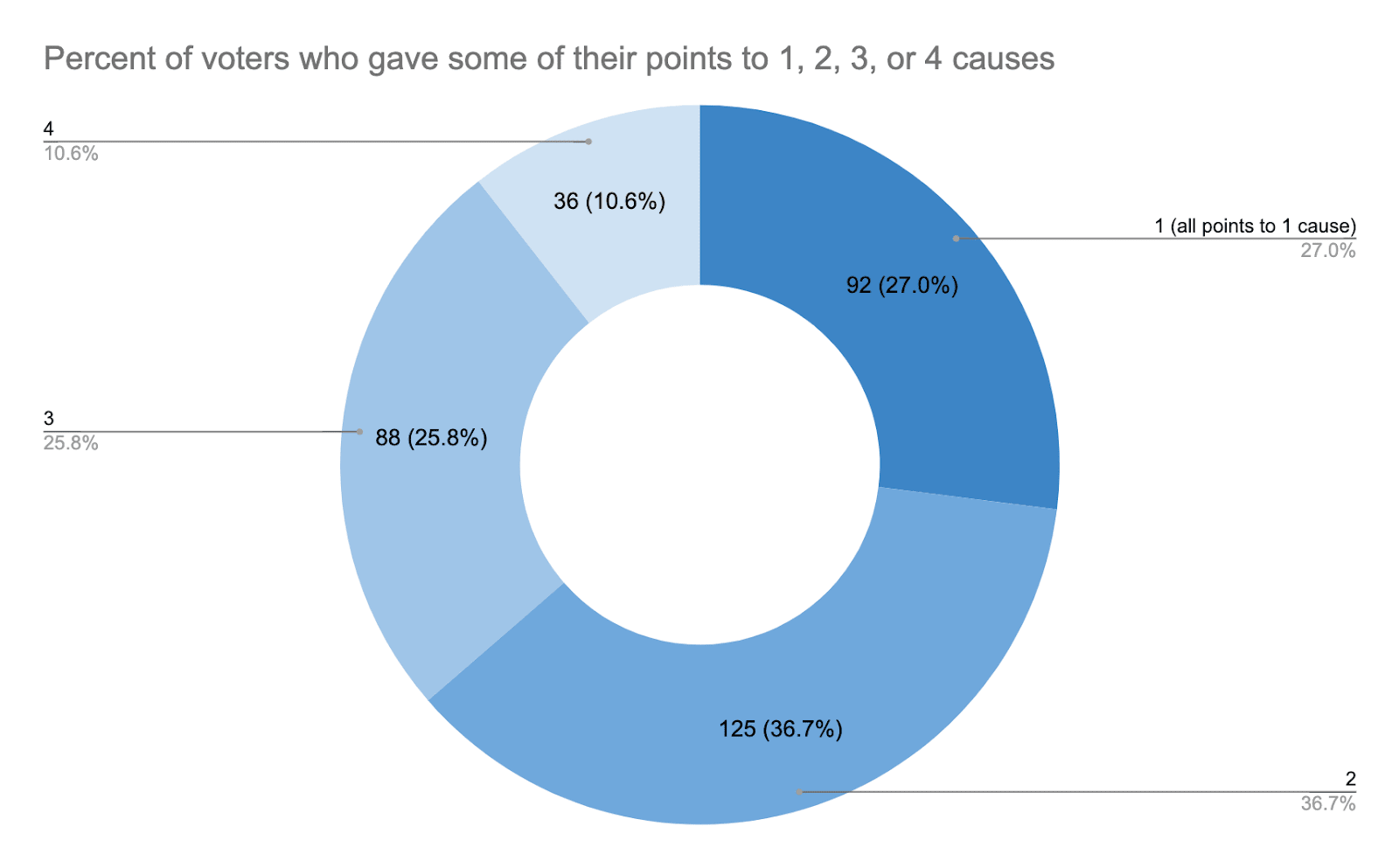
Four broad cause areas got similar numbers of points (and voters)
Points were split pretty evenly across four broad cause areas (see here for how I categorized projects into "cross-cause" projects, animal welfare projects, risk/future-oriented projects, and global health projects):
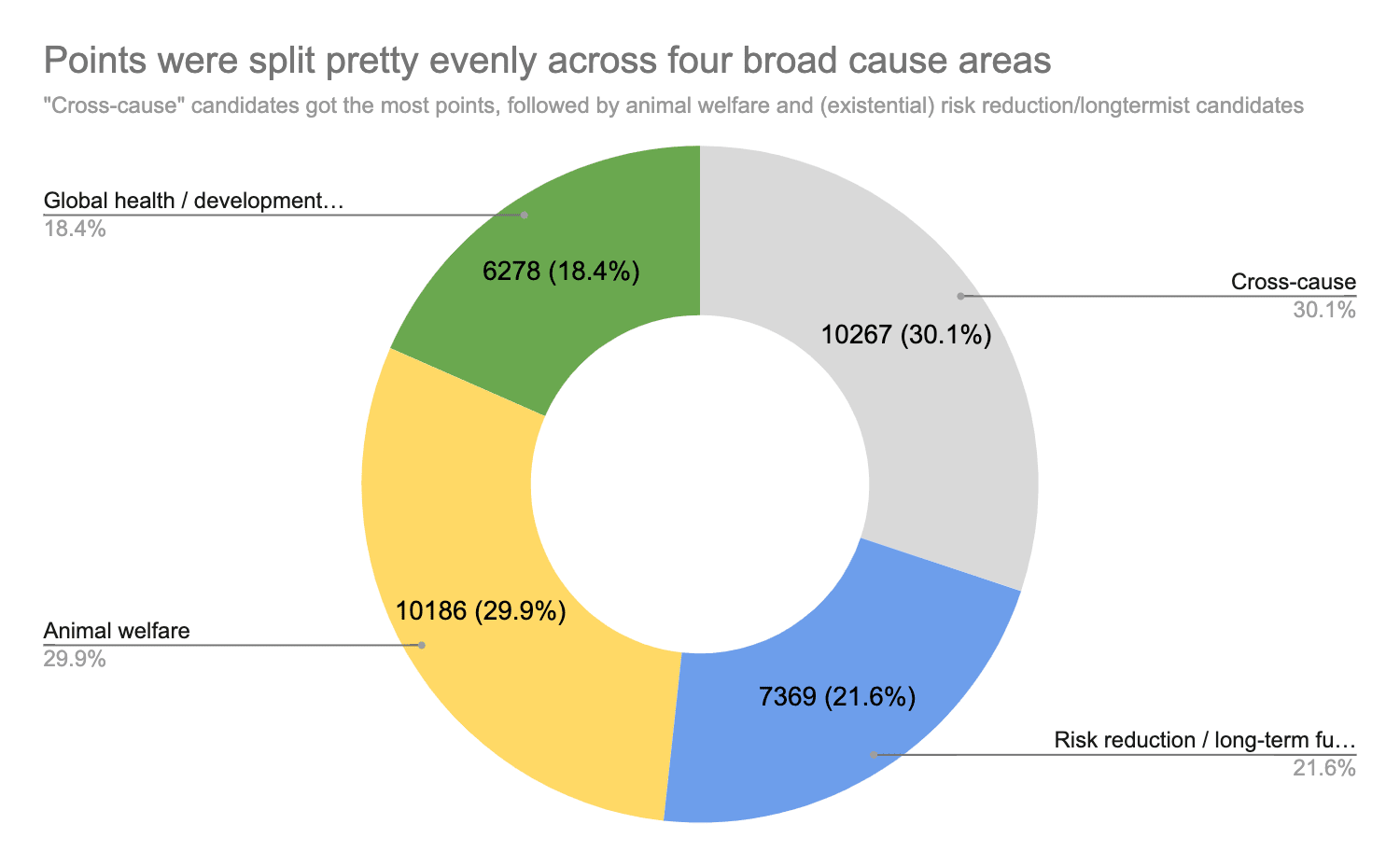
The number of “voters for [cause]” is also pretty similar across different causes, although there were more voters who gave at least some points to "cross-cause" candidates (72%) and voters who gave some points to animal welfare candidates (62%) than some-points-for-risk-reduction voters (47%) and some-points-for-global-health voters. The number of “hardcore [Cause A]” voters didn’t vary much (animal welfare had a bit more).
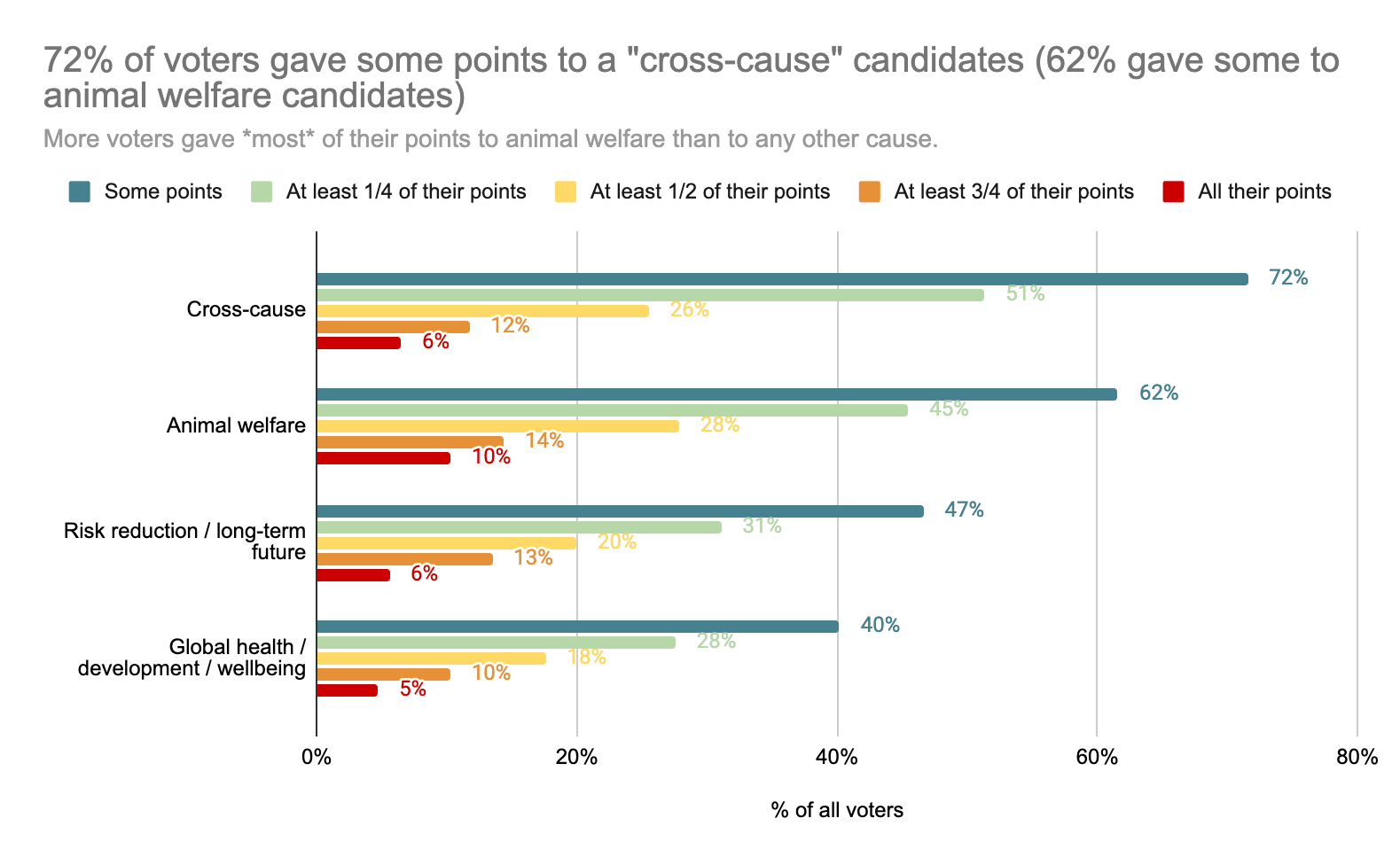
All candidate results and raw points totals
In our voting system, voters could give any number of candidates any number of points, which we normalized (so that everyone’s points added up to the same amount). Then we calculated totals for each candidate, eliminated the lowest-ranked candidate, and re-normalized people’s point totals (so if a voter had assigned some points for the now-eliminated candidate, their other points would count for more). Finally, we ran this process (eliminating the lowest-ranked candidate each time) until we arrived at three winners. (Here’s a full description of the voting system.[8])
So initial point totals (normalized so that every voter's points add up to 100) didn’t determine the final winners, but are still useful information about how voters distributed points across all candidates. The following table shows initial point totals, the order in which the candidates were eliminated by this process, and some more information about the election:
| Candidate | Eliminated after round… | Initial rank (based on raw point totals) | % of all initial points that went to this candidate | Breadth: the % of all voters who gave it points | Skew: the % of its voters who accounted for 90% of its points |
| Rethink Priorities | [Won] | 1 | 13% | 41% | 60% |
| CE: Incubated Charities Fund | [Won] | 4 | 9% | 37% | 61% |
| AWF (EA Funds) | [Won] | 3 | 9% | 33% | 68% |
| LTFF (EA Funds) | 21 | 2 | 10% | 28% | 62% |
| GW All Grants Fund | 20 | 5 | 6% | 24% | 57% |
| The Humane League | 19 | 6 | 5% | 23% | 61% |
| GiveDirectly | 18 | 7 | 5% | 19% | 48% |
| Fish Welfare Initiative | 17 | 8 | 4% | 22% | 59% |
| AMF | 16 | 10 | 4% | 21% | 61% |
| GFI | 15 | 13 | 3% | 19% | 58% |
| EAIF (EA Funds) | 14 | 9 | 4% | 21% | 59% |
| ALLFED | 13 | 11 | 4% | 17% | 46% |
| GWWC | 12 | 15 | 3% | 19% | 55% |
| Fish Welfare Initiative | 11 | 12 | 3% | 20% | 58% |
| MIRI | 10 | 14 | 3% | 11% | 50% |
| FP Global Catastrophic Risks Fund | 9 | 17 | 2% | 13% | 53% |
| ACE Movement Grants | 8 | 16 | 3% | 17% | 57% |
| Faunalytics | 7 | 18 | 2% | 13% | 45% |
| GHDF (EA Funds) | 6 | 20 | 2% | 11% | 56% |
| NTI Bio Program | 5 | 19 | 2% | 11% | 49% |
| Malaria Consortium | 4 | 21 | 1% | 11% | 51% |
| Charity Elections (GWWC) | 3 | 22 | 1% | 6% | 41% |
| FP Patient Philanthropy Fund | 2 | 23 | 1% | 8% | 50% |
| TLYCS | 1 | 24 | 1% | 7% | 52% |
It might also be interesting to look at how candidate projects varied in terms of how often people gave them some vs a lot of their points[9] (the percent of their voters who gave them <10%, 10%-90%, and >90% of their points):
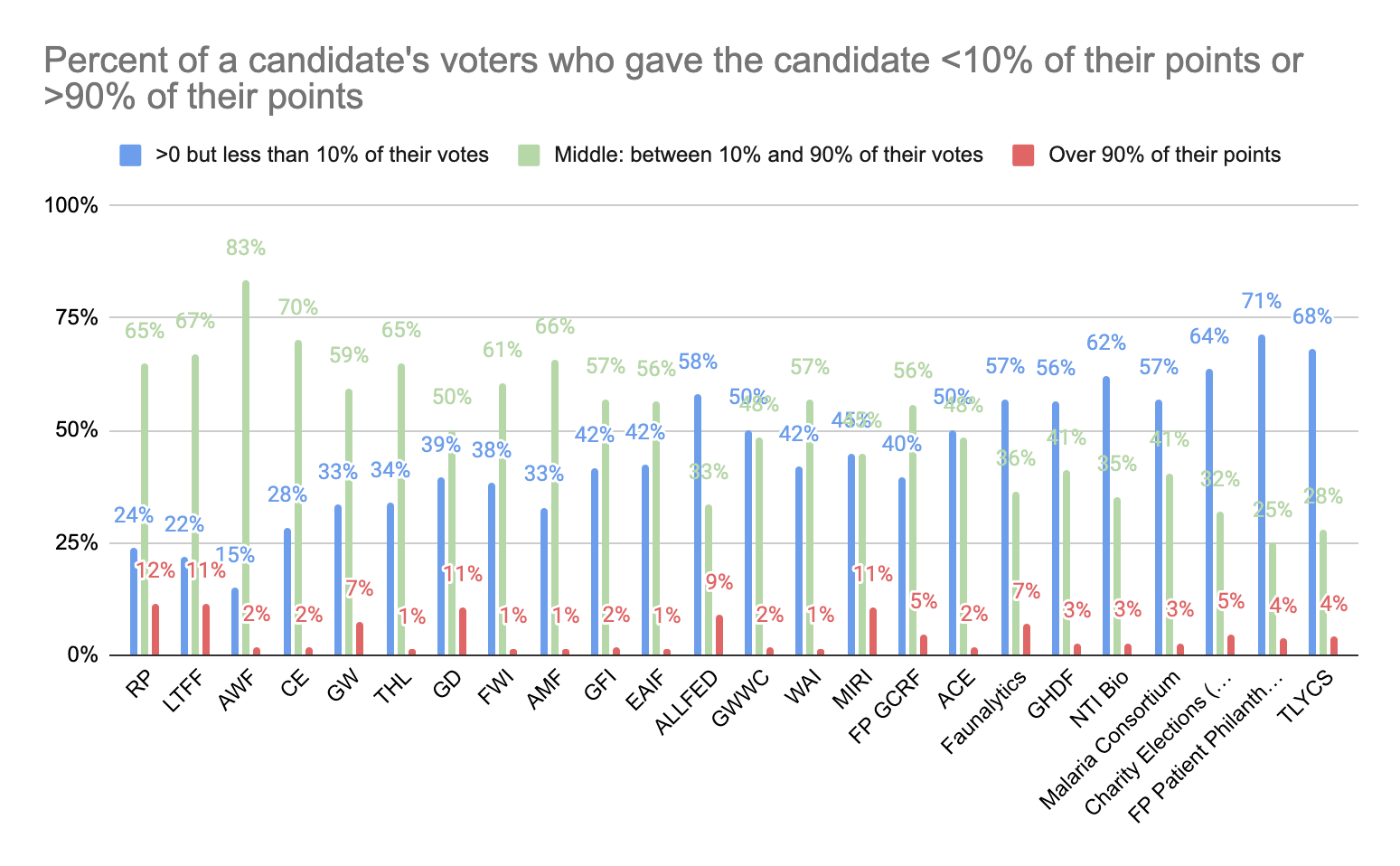
Finally, initial points were spread out more evenly across the four broad cause areas than the final results (pretty, unsurprisingly, given that there were going to be 3 winners):
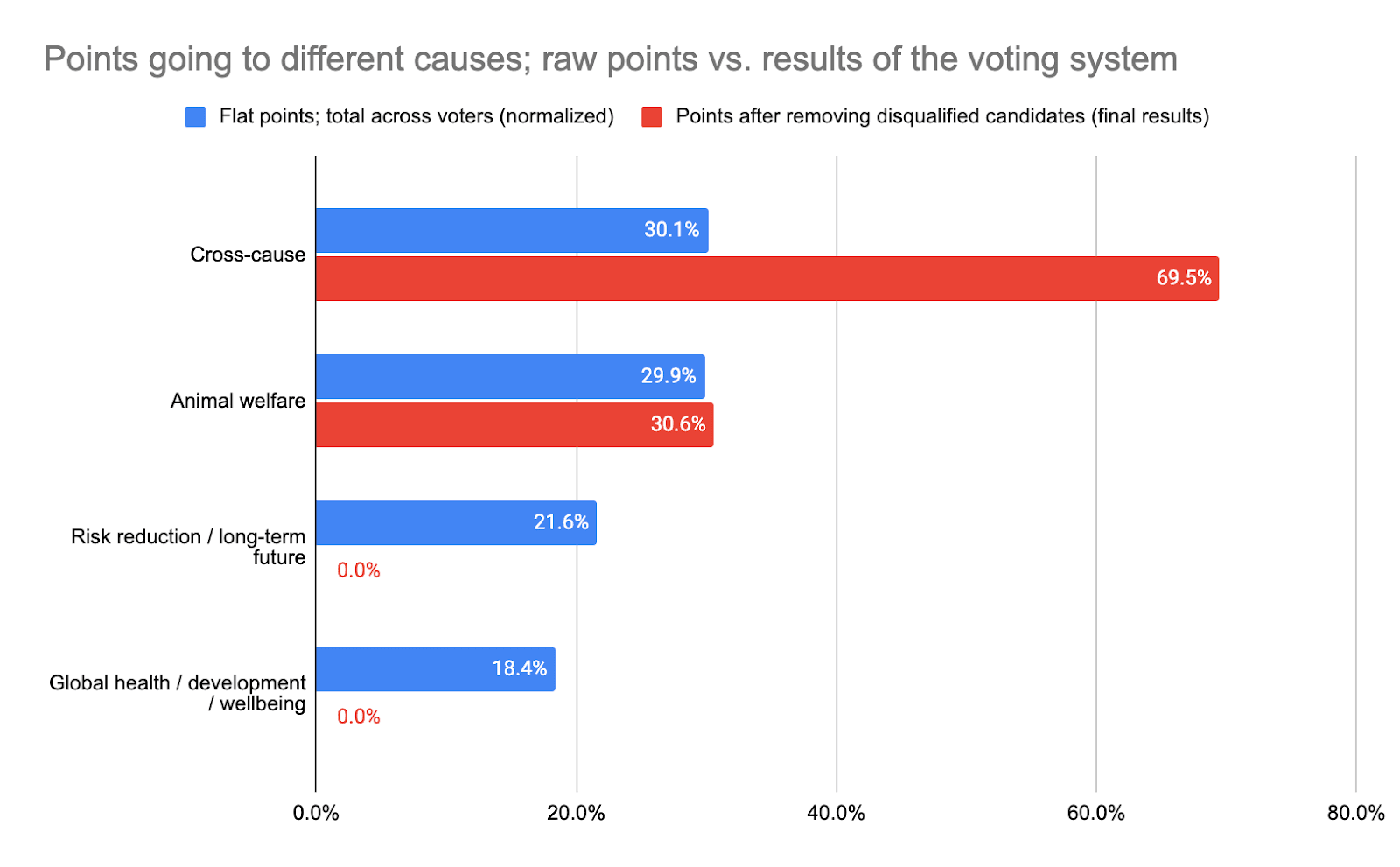
Consider exploring charities that weren’t candidates!
There were many promising charities that either couldn’t be added as candidates, or simply weren’t added this time. This includes a number of charities that shared information about their funding gaps and/or impact:
- The Centre for Enabling EA Learning and Research (CEEALAR)
- Doebem
- Impactful Animal Advocacy
- Legal Impact for Chickens
- ML Alignment & Theory Scholars (MATS) Program
- Riesgos Catastróficos Globales (RCG)
- High Impact Medicine (Hi-Med)
- Maternal Health Initiative
- Spiro
- Vida Plena
See more in this sequence, under the giving season tag, and here.
Concluding thoughts: I'd love to see follow-up discussion!
Did these results or data surprise[10] you? Do you disagree with how people voted, or want to better understand why they voted in certain ways? I’d love to see follow-up discussion on these topics — if you think voters misallocated their points, for instance, you probably also disagree with how they’re distributing resources elsewhere. (I also hope that this post will provide additional information on what people “in EA” prioritize, at least right now.)
You might also be interested in donating to a charity that you hoped would win, but didn't (and/or explaining why people should donate to it).
And we might run similar events in the future, so I’d welcome your thoughts on the Donation Election and Giving Season more broadly. (We might share more of a retrospective later, but I’m not sure we’ll want to prioritize a public post about this in particular.)
- ^
Only Forum users who had accounts older than October 22, 2023 were eligible to vote (a measure to prevent voter fraud). We advertised the election fairly widely, but I expect this still represents heavier Forum users more than lighter Forum users.
- ^
$5,000 of that was from the Online Team’s match. We’ll transfer the funds to winners when some people are back from their holidays in a few days. In case you're interested, here's some info on how many donors added to the fund:
- ^
Normalized such that everyone’s points add up to the same number (in this post, this is always what I mean by “points”)
- ^
I tweaked some slightly for clarity/length and/or to avoid highly recognizable styles (please reach out if you’re worried and would like me to remove your comment).
- ^
I.e. all the candidates they gave nonzero points to got eliminated as votes were counted, which meant that their votes counted as additional votes split evenly between the remaining candidates, which would in practice even out the final proportions a bit. Their votes are also included in the information about point totals etc. here.
- ^
- ^
- ^
Interestingly, I think approval voting would have yielded similar winners (with a big assumption about how to extrapolate what people would have “approved” of) — if you rank projects by the number of voters who gave it at least 10%, for instance, the picture doesn’t change much (if you increase from 10% to 20%, LTFF starts showing up in the top 3 again).
What would have happened with ranked-choice voting is very unclear to me; the voting system was in fact very different, and my quick attempts at trying to see what would happen if I tried to interpret the scores as ranks were extremely contingent on minor tweaks in how I interpret things and on decisions like whether I used “rankings” of all the candidates or only the top 10, etc. If I only rank points given when they amount to over 5% of a voter’s total points and add some randomness to produce rankings out of equal scores, the results look fairly similar, but I didn’t do things carefully.
- ^
Note that e.g. only 2% of AWF voters gave it over 90% of their points, but this doesn’t really mean that AWF has few "committed" voters; part of this is due to the fact that so many people gave some points to the AWF, but we can also see that AWF has a good chunk of voters who gave the AWF as many points as they gave any candidate (although in some cases they gave the same number of points to several candidates).
Chart: among the voters for a given project, the % of voters for whom the project was top-scoring (in decreasing order): LTFF, AWF, FW, RP, CE, GD, MIRI, THL, AMF, ALLFED, Malaria Consortium, FWI, GFI, FP GCRF, GHDF, Faunalyics, Charity Elections, GWWC, ACE, EAIF, WAI, NTI Bio, FP Patient Philanthropy - ^
This market predicted at least the order of the results decently well.

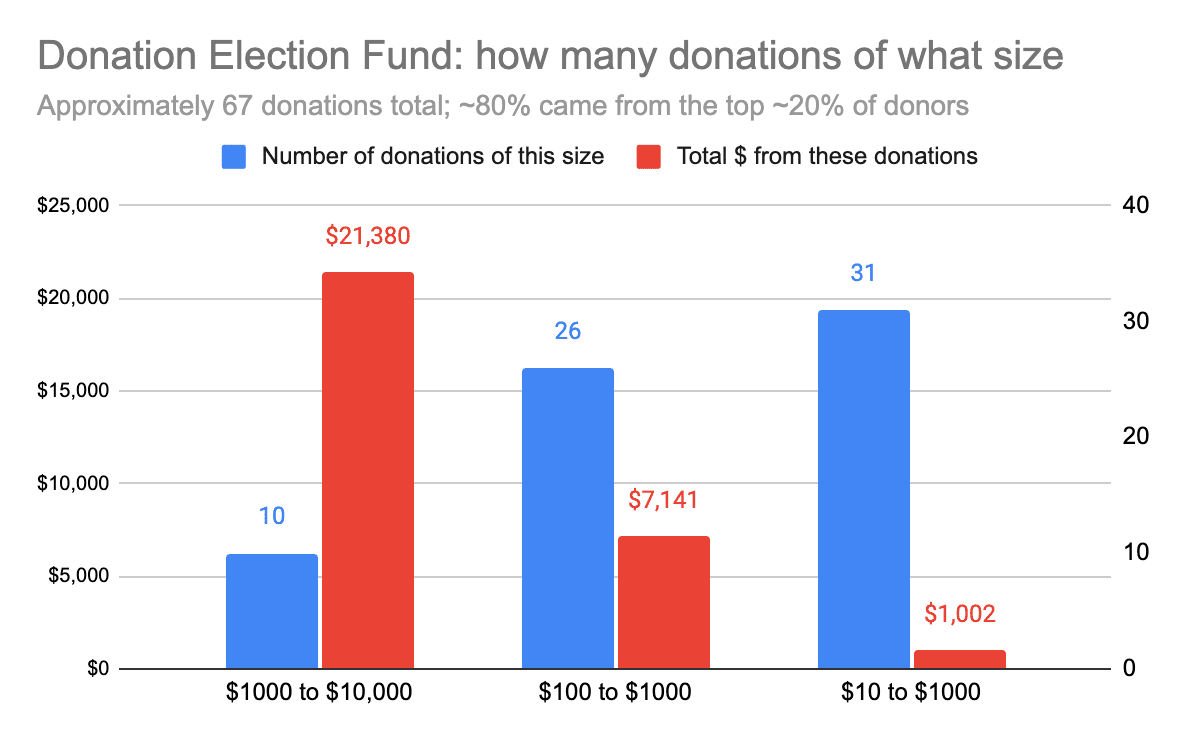

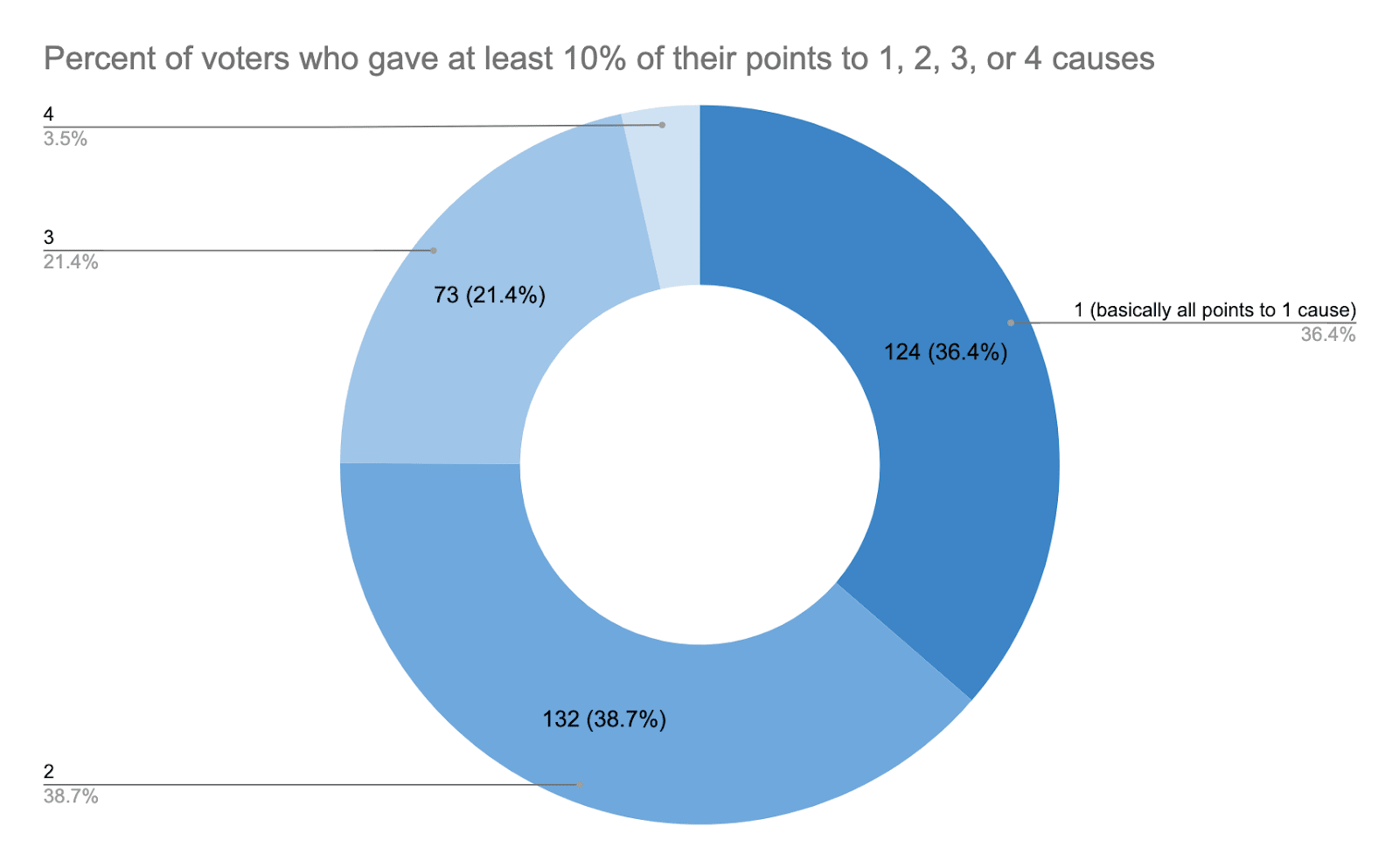
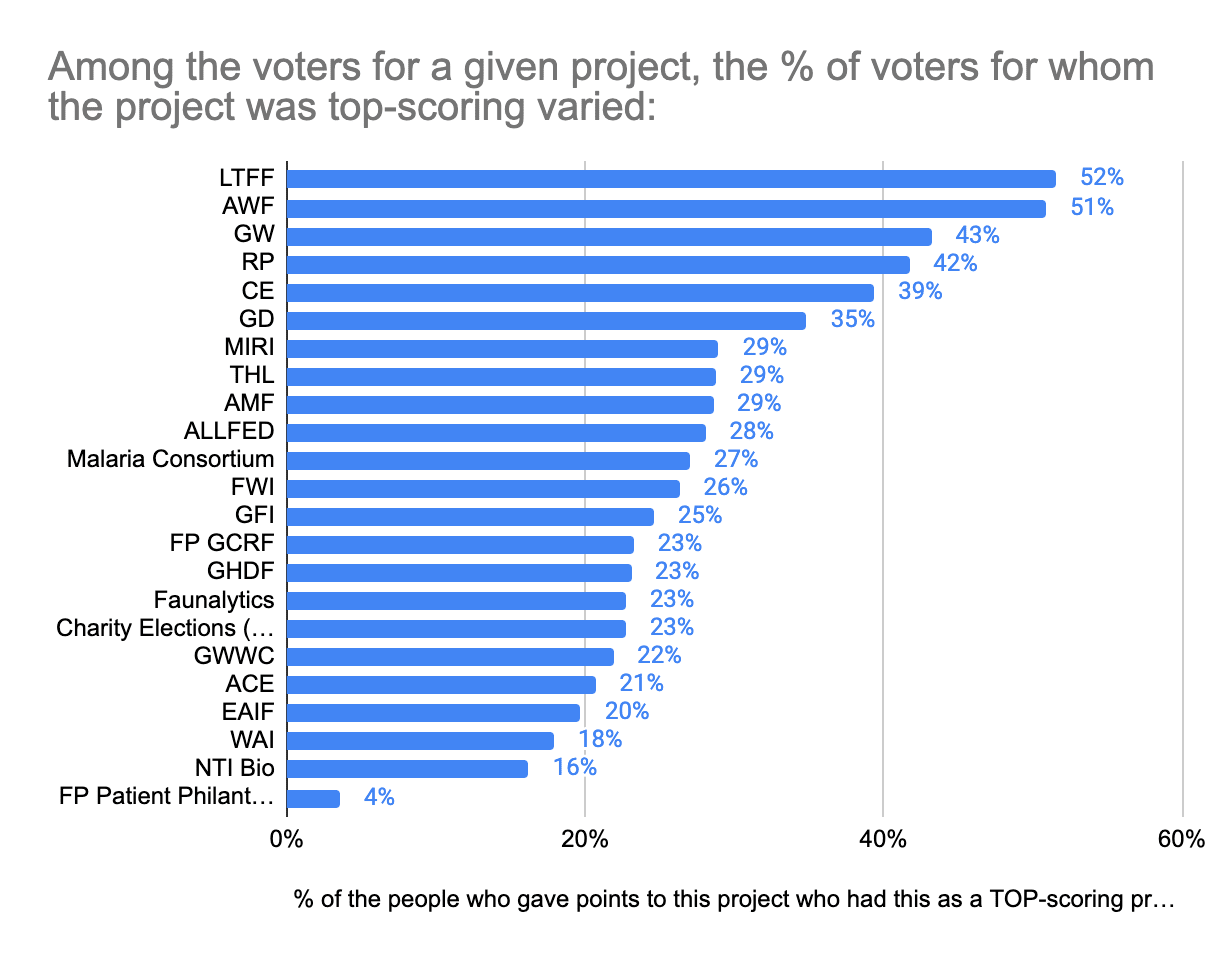
I really loved people's comments on why they voted the way they did, but this post is already quite long, so I'm sharing a longer list of excerpts as a sort of "Appendix Comment."
Why people voted the way they did (& other highlights from the comments) - extended edition
We asked voters if they wanted to share a note about why they voted the way they did (or something else). 74 people (~20%) wrote a comment. Some excerpts are slightly tweaked for clarity/length and/or to avoid highly recognizable styles (please reach out if you’re worried and would like me to remove your comment).
See the shortened version in the post above — this is the extended version. There's a bit of repetition, but I think most of it is new.
Rethink Priorities’s funding request post was mentioned a lot to explain why someone is donating to or voting for RP. People also noted specific aspects of RP’s work or approach that they appreciate:
CE’s Incubated Charities Fund (and Charity Entrepreneurship more broadly) got a lot of appreciation for their good and/or unusual ideas and track record:
A number of people wrote that they’d updated towards donating to animal welfare as a result of recent discussions (often explicitly because of this post). Many gave a lot of their points to the Animal Welfare Fund, sometimes explicitly citing GWWC’s evaluations of the evaluators. Some also said they wanted to vote for animal welfare to correct for its relative neglectedness in EA or to emphasize that it has a central place in EA:
And here are some comments about why people gave points or donated to other candidates, or other considerations people shared:
Broader patterns:
People also shared thoughts related to Giving Season:
Finally, shoutout to the voter who added: “Thank you for listening to my TED talk. I am legally obligated to tell you this is not financia-, err, altruism advice” after their (decently long) comment.
Thanks for sharing the results, and the detailed analysis, Lizka!
I would be curious to know:
So there were as many voters as 8 % (= 341/4443) of the monthly active EA Forum users in November. One could have voted quite quickly, so I wonder whether you have any thoughts on why participation was not higher.
I want to be really careful about not de-anonymizing voters (even internally), but I'll see what we can check safely.
Re: the number of voters: I'm not sure. I wish more people had voted, but it's generally quite hard to get people to do things (see e.g. the 1% rule and its variants), and this is not outside of my expectations.[1] We probably could have done more to advertise the election; I'd include that in lessons for next time (although I also think that, if the Forum runs another election in a year, there'll be more natural interest as this will be a more established "thing").
Some reasons I expect people didn't vote: people thought they were ~unqualified (I heard this worry and tried to push back on it here, but could probably do better in the future), they just weren't interested (e.g. because they didn't think this is relevant, or their favorite projects weren't candidates) or didn't have time, they just didn't hear about the election, or they meant to do it and never got around to it.
I should also flag that a lot of monthly active Forum users are ~weekly users, I think, and I expect that those are significantly less likely to vote. You can see this chart from the Forum survey we ran a while back (I'm hoping to share a writeup on it soon), which sort of illustrates this (it's a bit iffy because (1) the Forum survey will overrepresent more frequent users — although that arguably boosts my point, and (2) this question had an issue where people who use the Forum ~3 times a month don't really have an obvious answer to give, but oh well):
We (Online Team) had some very casual internal forecasts on how many voters we'd get. I had initially (late November) put 50% for getting to 400 voters (most other people on the team were lower), then went higher as we got closer to that goal, and lower again later when voting slowed down. (We also had forecasts for 200 and 100; I had started with 80% and 90% there.)
One can discern from the spreadsheet where the points of each eliminated organization went, at least initially:
None of this was too unexpected to me, but it is mildly interesting to get harder data on the relationship between cause area support and support for specific cross-cause / meta organizations. Specifically, we can see which cross-cause organizations voters tended to gravitate toward when an object-level charity in a given cause was eliminated.
(I only marked third-place gains that subjectively seemed to clearly exceed the rest of the field.)
I recall there was some discussion about different voting systems for the Donation Election. I think it would be interesting to see whether/how different the results would have been with a different system. We can't really retrofit the data to quadratic voting, but I think it would be possible for approval voting and rank-choice voting (for approval voting we could just say that any candidate receiving points from a person is approved, unless they voted for many candidates in which case just the top 12). I am not sure what codebase you have at the backend for this, but I could imagine switching the voting system could be fairly easy; maybe it isn't worth it though.
Thanks for bringing this up! I actually explored this a bit, but hid it in a footnote:
I was initially lazier with ranked-choice voting, but now finished a rough ~run of the elimination process and got very similar results as what we got with our voting system. Note that I chose the 5% cutoff as the thing that seemed most reasonable given how people voted before I saw the results with this translation into RCV, but things might in fact still change quite a bit if you choose a different translation into RCV (e.g. only the top 5 projects people gave points to, instead of the projects people gave at least 5% of their points to). The ranking I got was:
(Please don't trust these results too much, though; I was not careful here.)
Re quadratic voting, see also here.
Whoops my mistake. OK thanks, interesting! Maybe next year we can have an informal meta-vote beforehand on which voting system we want to use ;) I think currently I am in favour of RCV but maybe I am biased by being Australian and the fact that we use that here, so it seems especially intuitive and nice to me.
Someone else I talked to is also in favor of RCV, and I agree that it has benefits (e.g. easier to use than this system), but I also think it has some downsides — e.g. I think it's a worse exercise for voters than this system is. Btw, you might also be interested in the discussion that happened on my quick take before we decided on a voting system.
(My current top, low-resilience guess about changes we should make to the voting system, if we ran this again, is that we should remove the 3-winner restriction and that we should think about trying to get people to vote on cause/problem areas — separate from voting on charities.)
Nice, wow there was lots of engagement on this beforehand! I think I am now leaning towards abrahamrowe's suggestion to just take the average of everyone's distributions, possibly with some minimum threshold to avoid the hassle of disbursing small amounts of money. But so many considerations - a more complicated decision than initially meets the eye I think.
I object to your translation of actual-votes into approval-votes and RCV-votes, at least in the case of my vote. I gave almost all of my points to my top pick, almost all of the rest to my second pick, almost all of the rest to my third pick, and so forth until I was sure I had chosen something that would make top 3. But e.g. I would have approved of multiple. (Sidenote: I claim my strategy is optimal under very reasonable assumptions/approximations. You shouldn't distribute points like you're trying to build a diverse portfolio.)
Thanks! I agree that the approach you describe is optimal under very reasonable assumptions, but I think in practice few people used it (the median ratio between someone's top choice and their second choice was 2, the mean if you throw out one outlier was ~20; only 7 people voted for at least 2 candidates and had ratios between their top two that were at least 20). Moreover, we had some[1] voters who didn't vote the way you describe, but who did assign a fairly big number of projects similar small point values — I think kind of throwing in some points for charities they don't favor that much, and I didn't want to overweight their votes in the way I tallied the RCV-translated (or approval-translated) scores.
Still, I agree that my translations are bad — I should at least represent scores from people who basically approximated RCV in the current voting method the way they would be counted in RCV. I might try this (and think about what translation actually makes sense — just the top 10 charities people voted for?) later, but might not prioritize doing it.
For approval voting, you could also just look at the number of voters who gave a charity any (positive) number of points; these counts are included in this post and wouldn't have changed the top 3.
Quickly estimating: there were 90 voters who voted for at least 4 candidates whose last two votes differed by a ratio of less than 1.5. There were 27 if instead of requiring at least 4 candidates, you require that the smallest point assignment is <5.
Or looking at it another way: across all ratios (across all voters) between what a given voter gave the candidate they ranked N and the candidate they ranked N+1, if we remove only the top 1 percentile of ratios (removing because a few people did use an approximation of RCV - equivalent in this case to removing ratios higher than 100:1), the mean is 2. Across all ~12K ratios, about 500 are exactly 1.
There are many different voting methods that use ranked ballots, and it's frustrating that one of the worst gets all the attention, and is considered synonymous with the term "ranked choice voting".
Do the ranked ballots produce a Condorcet winner? A strict Condorcet ranking of the rest?
Probably no way to answer this with available data, but I'm curious about the extent to which individual revealed preferences (election votes edition) are concordant or discordant with their revealed preferences (personal donations edition). To the extent they are discordant, what factors might explain the discordance, and what might we learn from having two different types of revealed preferences to pull from? This loops back into some of the discussions earlier in the year about whether there should be more of a community voice in funding allocation and if so how that could be carried out in a way that is less open to manipulation.
For instance, I think this system makes it frictionless for me to specify smaller preferences (and even mildly encouraged doing so). That strikes me as an advantage it has over GWWC pledge fulfillment information, where even if I take the time to give to the organization that is tenth on my list, I might not take the time to enter that donation into the GWWC database. In contrast, I think the structure of the Donation Election mildly encouraged me to give points to organizations I thought would generate lots of other votes as well.[1]
(My own votes didn't track my donations that closely, but that may be due to unusual personal circumstances this year for me).
Only mildly so -- e.g., a voter would be disenfranchised in all rounds after all organizations to which they assigned votes were eliminated. They would be treated as indifferent among all remaining choices. Thus, a rational voter who was not indifferent would distribute points such that they threw at least one point to an organization they expected to be in the top four. Given that most voters gave points to 2-4 organizations, this probably creates a small bias toward organizations perceived as more popular.
I agree that this is hard with available data. I guess we could try to look at donation data e.g. from here or responses to this post and see how well it matches what people collectively voted for (ideally weighted by ~Forum engagement), but both groups are probably pretty different from the voting group (and the second group is small). A lot of comments on why people voted the way they did also noted something about why they're donating to the candidates they voted for (but definitely not all comments).
Also: